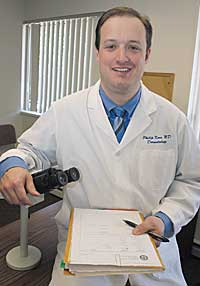  |
| HOME | THIS ISSUE | CALENDAR | GRANTS | BACK ISSUES | < BACK | NEXT > |
Health Center’s melanoma clinic strives to treat disease at early stageby Carolyn Pennington - June 18, 2007 | ||||
| The incidence of melanoma, the most deadly type of skin cancer, is growing fast. The percentage of people with melanoma has more than doubled in the last 30 years. The melanoma program at the Health Center offers patients services to help ensure that the disease is caught in its earliest and most curable stage. The program offers multidisciplinary care through a team of doctors – dermatologists, an oncologist, and a surgeon – who have a special interest in melanoma. “If you’ve been diagnosed with malignant melanoma, it’s important that there’s a coordinated approach, because you’re going to be seeing several different doctors who will be giving you a variety of care,” says Dr. Philip Kerr, assistant professor of dermatology and dermatopathology and director of the Melanoma Clinic at the Health Center. “Because we’re all located at the Health Center, the interface between doctors is much easier and we’re able to take a comprehensive team approach to each patient’s individualized care.” The Health Center is the only facility in the state that offers whole body digital imaging to monitor and track potential skin cancer in high-risk populations. “It’s similar to your dentist keeping x-rays of your teeth and updating them regularly,” says Kerr. “Melanomas change in appearance over time, anywhere from three to 12 months. The photos provide a historical reference so we can catch changes earlier and in the long run save lives.” They may also serve to reassure patients that a suspicious mole looks the same as it did six months ago, and may save patients from unnecessary biopsies, he adds. Melanoma generally begins in the skin, but can spread rapidly to other organs and bones. That’s why an early diagnosis is crucial. The Health Center has five dermatopathologists and an extremely busy dermatopathology laboratory that provides services to the hospital and private practitioners throughout the region.
Using a state-of-the art microscope with multiple lenses, the dermatopathologists are able to review difficult cases together. “It’s quality assurance,” says Kerr. “Instead of just one pair of eyes looking at a suspicious sample, you have several, and that greatly increases the odds of an accurate diagnosis.” When a melanoma diagnosis has been made, the degree of risk can be determined by how deeply the malignant cells are invading the skin. Research has shown if the melanoma is less than a millimeter deep the prognosis is very good. If it’s more than a millimeter deep, the cancer is more advanced and more likely to spread to the lymph nodes or the major organs in the body. Surgical oncologist Lori Wilson specializes in sentinel node biopsies, which can better determine how far the cancer has spread. Dr. Upendra Hegde, a medical oncologist, also has a special interest in melanoma and can help patients determine their best treatment options. He also advises patients with advanced disease about the clinical trials available and appropriate for them. For recently diagnosed patients, the Health Center plays host to the statewide melanoma support group, which offers emotional and educational support. Oncologists, surgeons, nutritionists, and psychiatrists speak about the latest treatments and research, and answer questions. The melanoma program has plans to expand, by developing a Cutaneous Oncology Center as a regional center of excellence. Funds raised at the inaugural “Imagine Ball” to be held Oct. 20 at the Wadsworth Atheneum in Hartford will help recruit new faculty and bolster research initiatives for the new center. |
| ADVANCE HOME UCONN HOME |

